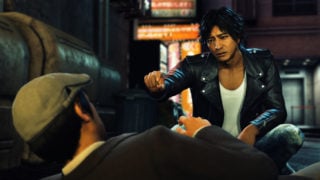Review: Judgment is a Yakuza game in disguise
Sega’s spin-off doesn’t deliver on its investigative pitch, but its humour still shines
- Game Director
- Koji Yoshida
- Key Credits
- Kazuki Hosokawa (Art Director / Producer), Tsuyoshi Furuta (Script Writer)

What sane person would choose to live in Kamurocho, the central setting of the Yakuza series?
Repurposed for six games – not to mention spin-offs and remakes – this tiny cluster of casinos, burger joints and hostess clubs has seen enough violence to depopulate entire countries, let alone a square mile of retail. Walk its streets and you’d feel the crunch of loose teeth underfoot, such is the number of hoodlums powerslammed into tarmac by long term hero Kazuma Kiryu.
And so the pitch of Judgment comes as a relief: you are no longer the ‘Dragon of Dojima’ but Takayuki Yagami, a lawyer-turned-investigator. And a person like that isn’t going to hit punks with traffic cones, right? Not so fast. Yagami trained as a lawyer under the patronage of a yakuza elder, his best friend is an ex-yakuza heavy and his client list consists mainly of… yakuza. For all the talk of a fresh perspective, the right side of the law looks a lot like the other, punchier side of the law.
Judgment follows the rhythm of previous Yakuza games. You roam the recycled streets of Kamurocho (still shiny from the game’s recent Dragon engine overhaul), brawling with local scum and enjoying a generous menu of side activities. The usual darts and batting cage are joined by a parody of House of the Dead and a bizarre VR event that plays like Mario Party with cracked skulls. It’s good to see Fighting Vipers join the selection of Sega arcade cabinets, too – its focus on hoofing rivals through fences is a good match for the game’s OTT combat.
And Tak is a fighter, the long arm of the law ending in the hard fist of the law. Compared to Kiryu he’s acrobatic, leap-frogging opponents and launching off walls like a bullet. The latter is so overpowered that fights can easily become a surreal loop of a man ping-ponging between a wall and a goon’s face. He has two fighting stances, but anyone hoping for the depth of Yakuza 0’s three styles will be disappointed: one is good against groups, the other one-on-one. The wide hitboxes of the solo style do pretty good damage to groups too.
Scrapping is brash arcade fun, but it’s the easiest the series has ever been – maybe to accommodate newcomers expecting Inspector Morse instead of Rocky-with-a-magnifying glass. There also seem to be fewer of the ludicrous heat moves, or perhaps fewer fights with novel context sensitive takedowns. A couple of fights alongside an ex-Yakuza friend allows staggeringly painful tag team combos, and there’s a bit of fun involving a fishing pond, but generally Judgment leans towards a more straight-faced tone.
“One chase sequence involves chasing a wig being blown away by the wind, which helps distract from the fact that you’re just pressing triangle as you approach traffic cones at speed.”
If fighting feels streamlined, it’s to make way for Judgment’s investigative work. The problem is, playing detective largely boils down to minigames, rather than a substantial change of direction. Tak can tail suspects, but this is deeply tedious – you just duck behind glowing items when the perp turns around. It’s dull by the end of the tutorial, let alone the fiftieth time. And chase sequences are little more than quick time events – one involves chasing a wig being blown away by the wind, which helps distract from the fact that you’re just pressing triangle as you approach traffic cones at speed.
Photography is more novel. It’s set up as a sordid Pokemon Snap – catch the infidelity at the juiciest moment for the most points – but happens so rarely to turn into a proper activity. Likewise Tak’s drone, which is introduced as the means to spy through windows, adding an interesting surveillance wrinkle, before being banished from the meat of the game’s run time.

As for crime solving? At the outset, Judgment appears to riff on Ace Attorney – the first case has several moments where you have to present evidence or pick relevant questions from a dialogue tree. This is the stuff of virtual detective work you expect, but after the initial tutorial case, this mechanic all but disappears for the next 20 hours. Instead, the ‘detecting’ takes place in the cutscenes. You reach a mission marker and watch the story play out. If you’re going to sideline the investigator, this may as well be another Yakuza game.
Judgment gets closer to a proper detective game when it taps into your grasp of local knowledge. When a mad bomber offers vague clues to his next target you get to put hours of walking the same streets to good use. Likewise, when cases ask you to seek expert knowledge from local businesses. It doesn’t take Sherlock Holmes to work out to ask at the sushi shop about a disgruntled sushi chefs, but the simple act of putting one and one together is more engaging than having solution play out at an objective marker.
“At the outset, Judgment appears to riff on Ace Attorney – the first case has several moments where you have to present evidence or pick relevant questions from a dialogue tree.”
Tak’s reliance on the local community is the most enjoyable departure from Yakuza games of old. Kiryu was always a good samaritan, open to helping any oddball who approached him, but Judgment lets you befriend locals for more tangible rewards. Most businesses host a character with trouble in their life – a barista wants to stop offending foreign guests with mangled English, a strange waiter wants to test your knowledge of steak cuts – and following quests through result in them selling new items or giving gifts when you next see them.
In some cases they join the fight – beat a ninja at darts and he’ll lob smoke bombs at your enemies – or offer assistance from the sidelines. The moment a local convenience store worker tosses a bottle of hot sauce to pour into a gangster’s eyes is when you feel that Yakuza magic at its most potent: the perfect marriage of slapstick horror and payoff for your busywork elsewhere.
But more than a collection of comedic favours, Judgment shows a side of Kamurocho not always seen when you’re playing high stakes Yakuza politics. Tak is a local businessman looking out for others like him – you aren’t empire building, but helping everyone get along, from the locksmith who gives you freelance lockpicking work to the landlady who needs you to be a guinea pig for her rancid cooking. Befriending these people increases your ‘reputation’, in turn opening up more side cases, but you find yourself doing it for the sake of the city instead of mining a game for content. It’s genuinely very sweet.
This isn’t to say the community is always welcomed. There’s an ongoing side story about a new gang trying to move in Kamurocho. They appear every hour or so, raising the districts’ ‘threat’ level until you either hide for long enough or take down gang leaders.
“Like the ridiculous vampire costume Tak can wear to go undercover, Judgment is plenty entertaining, but it is just a muted Yakuza game in disguise.”
The latter are basically minibosses, but the way they appear in the same locations and say the same thing every time gets boring quickly. It gets to the point where you dread to open phone messages, knowing that it’s going to be a bullied shopkeeper asking you to sort out the gang problems again. Believe it not, there is only so much hot sauce you can pour in the same boss’ eyes before it gets dull.

But for every recycled moment, there’s always a barmy side quest or story twist to counteract it. As is the Yakuza way, the weird side stories do a lot of heavy lifting, and here they make a bit more sense, as they’re framed as cases for Tak to solve. The concepts are often so strong – a gang of notorious perverts to track down, exorcising a haunted apartment, the aforementioned wig escape – that you can overlook the relative mundanity of the building blocks used to construct each one.
And as much as you’re cast as the bystander in your own case, the central knot of mysteries do carry you through the thirty or so hours required to untangle them. It’s just a shame the game doesn’t fully commit to the brilliant concept of seeing familiar territory from non-yakuza eyes. Like the ridiculous vampire costume Tak can wear to go undercover, Judgment is plenty entertaining, but it is just a muted Yakuza game in disguise. And after so many games of smashing faces into concrete, we hoped for a little more than that.
Judgment doesn’t deliver on its investigative pitch, but its humour and sense of place still shine.
- Kamurocho has never had a better sense of community
- Hundreds of side missions and activities to keep you busy
- Investigation minigames and gang invasions get tiresome
- You don’t get to do much detective work






















